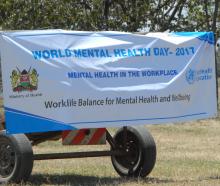Mental Health: Promote better workplace and well being
World Mental Health Day 2017 was commemorated in Kenya with a call for changes at workplace to reduce risk factors for stress and policies that ensure work environment promotes wellbeing and productivity. Speakers at the commemoration event urged workplace communities to talk about depression and other mental health problems like substance abuse in order to promote best practice, decrease negative attitudes and empower individuals. They also encouraged stakeholders to invest in healthy workplace through transformative leadership and help reduce risk factors for stress in the workplace and initiate policies that promote wellbeing and productivity. The day is set aside to raise awareness about mental health issues and mobilizing efforts in support of better health.
The commemoration on October 10 was held in Gilgil, Nakuru County, and addressed by among others WHO Kenya Representative, Dr Rudi Eggers and Director of Medical Services Dr Jackson Kioko. The latter was represented by Dr Izaq Odongo, head of department of Clinical and Specialized Services. The event was also attended by health workers, the civil society including Red Cross and World Vision, members of the public and government officials. The venue was particularly ideal in that Gilgil County Hospital has a very long history (more than 50 years) of caring for long-term mental health patients, some of whom have spent most of their lives in this facility.
This year’s theme: “Mental Health in the Workplace,” was hailed as timely call for work place work/life balance and strong policies to support the wellbeing of the work force. It was also considered significant in addressing the value and promotion of mental well-being in the work settings as a key aspect of employees’ overall health.
“Mental health is paramount for an individual interaction and performance in their work environment and the vice versa, work environment can impact on health,” Dr Odongo said.
Citing WHO’s definition of mental health, Dr Odongo explained that it was a state of well-being in which an individual actualized their potentials or abilities, cope with stresses of life, work productively and fruitfully, and contribute to the communities.
Mental illnesses, he added, deprived an individual of all these and led to significant burden of disease, loss of productivity and disability. The symptoms of depression, such as difficulties in concentrating, making decisions and remembering, were present up to 94% of the time during an episode of depression causing significant impairment in work function and productivity.
Globally, there was growing burden of mental illness with one-in-four (1:4) persons likely to experience a mental health problem at some point in their lifetime. Mental, neurological and substance use disorders accounted for 13% of the total global burden of disease.
“These statistics point to the need to make deliberate efforts to support initiatives geared towards mental well-being,” he added.
Dr Odongo said the Ministry of Health was implementing the Kenya Mental Health Policy 2015-2030 with a goal to attain the highest standard of mental health. Some of the priority actions include: workplace programmes to assist workers in handling stressful work life situations, strategies to ensure no stigma and discrimination to persons with mental health problem in workplace and alcohol and substance abuse prevention and management.
WHO Kenya Representative Dr Rudi Eggers said mental health was often neglected as a key aspect of employee health and called for Kenya to promote mental health in the workplace, and build broad coalitions to promote best practice, decrease negative attitudes and empower individuals to promote good mental health for all.
He said at least half of people with depression did not receive treatment and in the African Region, lack of information, stigma and cultural issues were significant barriers that prevent people from seeking help.
Touching on economic loss due to mental health illness, Dr Eggers said work-related stress cost global society billions of dollars annually in direct and indirect costs. An estimated 10% of the employed population took time off work for depression, and an average of 36 work days were lost when a worker got depressed. Symptoms such as difficulties in concentrating and making decisions cause significant impairment in productivity at work.
He said treating anxiety, depression and other mental health disorders was affordable and cost effective way to promote wellbeing and prosperity. Depression was preventable and treatable if diagnosed early, he added. “Eighty per cent of those treated improve, usually within four to six weeks”, he emphasized.
The causes and consequences of work-related stress were best handled through a combination of both collective and individual measures, with a focus on prevention.
He urged employers to become change agents by modifying risk factors for stress in the workplace and creating a climate that promoted wellbeing and creativity. Employees could take steps to learn the signs and symptoms of a mental health problem and engage in prevention, including talking about it he added.
Others who spoke at the function included the Medical Superintendent Dr Murage, Chairman of the Health Management Board and members of the County Assembly among others. The function was entertained by songs and scripts citing the theme of the year. Notably were the children from Giligil Township primary school of disabled children.









